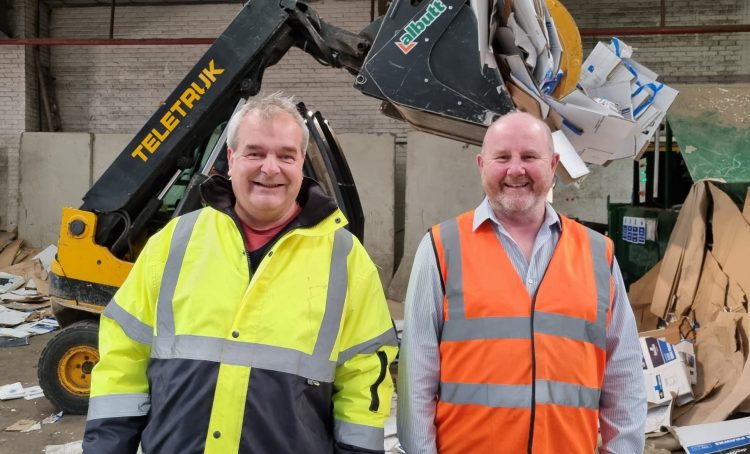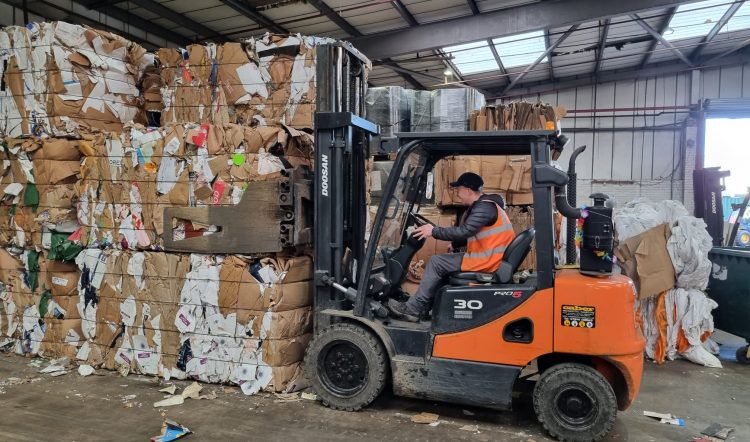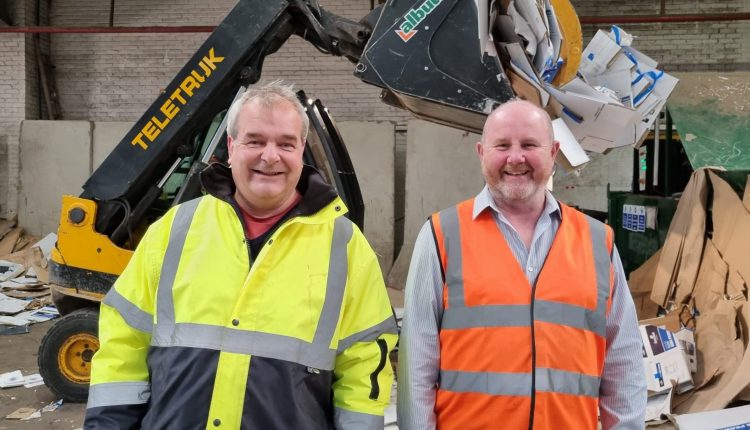Mersey business that’s ahead of the carbon curve
‘Carbon footprint’ is an everyday phrase when 20 years ago it would have elicited a puzzled expression – but there is one Merseyside company that has long been ahead of the curve. Tony McDonough reports

Go back 20 years ago, if you used a phrase such as ‘carbon footprint’ most people would look at you strangely.
But even back then it was common parlance for Environmental Waste Controls (EWC), a waste management company in Knowsley that has more than 500 clients across the UK and employs 75 people.
It can handle pretty much every conceivable kind of waste, with the exception of nuclear and clinical waste. More than 99% of the waste it handles is recycled, reused or converted into energy.
“We call it waste diversion,” said George Fludder, managing director and joint owner of EWC which is based in Knowsley. “We started this process about 20 years ago. People weren’t talking about carbon footprint at that time but we were.
“Over the years things have changed immensely. Back in the day a lot of waste was going to landfill. Our business started by supplying waste compaction equipment to hospitals and other customers.
“We saw a unique opportunity to reduce the carbon footprint of companies by bulking up waste.”
EWC was formed in 1998 but, following a management buyout in August 2018, the business has been jointly owned by George and finance director Chris Denham.
Among its client roster are local authorities, for whom it runs domestic waste recycling centres, hospitals and blue chip customers including well known football clubs and a national joinery chain.
It employs around 30 people at its headquarters in Prescot where it operates its own waste transfer station known as a materials recovery facility (MRF). The rest of its employees are based on site with its bigger clients.
George said: “As a business we pride ourselves that 99% of the waste we handle is either recycled or reused. The way this business works we will reuse anything we can reuse
“There are certain customers that very occasionally will produce something that cannot go anywhere else other than landfill. One company produced highly flammable and toxic material that had to go to landfill.”
Rather than just collecting and dealing with clients’ waste, EWC also carries out ‘waste audits’. Chris Denham says: This is one of our specialist sidelines.
“This is where we will go into any of our customers and do a waste audit on their waste streams. And then we will educate them on how they best present it to save them sending it to landfill and maximising their returns.
EWC’s philosophy is based around what is known as the ‘waste hierarchy’. The aim of the waste hierarchy is to “extract the maximum practical benefits from products and to generate the minimum amount of waste”.
According to George, there are five levels in the hierarchy. Number one is to aim to avoid producing waste in the first place. Number two is reuse and number three is recycle. Fourth step is to convert waste to energy and landfill is the absolute last resort.
“We have seen a big rise in demand in recent times. More and more people have become aware of the potential for environmental harm from waste materials and also their carbon footprint,” said George.
“Companies are also looking for accreditations and to comply with all the regulations and insurances that go along with that.
“There are more unscrupulous operators in the market than you may think. We prove our credentials with our customer base which is quite big. We have local councils, hospitals and big blue chip companies.

We have our very own waste transfer station right here. We will bring cardboard, polythene, polystyrene, mixed plastics, timber – anything that we can recycle, divert and generate a revenue from our local work comes back here.
“We then secondary sort it then bulk it up by baling it and then retailing. If the material is a real mixed bag that is not worth separating we will take it to another local transfer station where it will be converted to energy.”
Chris added: “With household waste around 25% goes to energy but with us it is 30%. Industrial waste is a bit easier because you have a more homogenous group of waste channels – cardboard will go one way, plastic another. It is much more efficient than household waste. You are talking about recycling rates of 99.9%.”
According to Chris, demand from small and medium-sized businesses is now growing. Not only are regulations tightening but many more are simply keen to do the right thing.
He explained: “If our customers can separate their cardboard then we can actually buy it from them. We will bring it here, bale it. Then we will make around X a tonne and give them a subsidy. So it is in their commercial interest to separate it out.
“When you send waste to energy you are looking at an average Cost of £130 to £150 a tonne. If your cardboard is worth £70 a tonne it is worth separating it from your general waste stream for recycling because not only will you save the £130 per tonne you will also receive £70 per tonne for the privilege.
“New laws are forcing everyone down the same route. And people want to go down that route. Not only will they save money but they are doing the right thing as well.
“If someone has only one bin a week then there is not much we can do for them. It is more the bigger organisations. There is no panacea for small businesses. You have to be able to fill a few bins with cardboard to make it worth the while. Wheelie bin work is not our forte.”
George added: “The automotive sector, for example, has very stringent requirements. They are very keen to be seen to be doing the right thing. There is a big spotlight on manufacturing these days and on how it handles its waste.”
Although EWC works with clients across the UK it strikes a lot of what it calls “strategic partnerships”. These are reciprocal arrangements with other waste management firms in other parts of the country.
“We tend to be able to negotiate quite good deals with other business partners. We form relationships,” said George. “They may have waste in this part of the country that they want us to move and they might move some for us.”
READ MORE: Knowsley brake disc firm wins £100m contract
READ MORE: Work to start on 97,000 sq ft development
Chris added: “It is uneconomic to handle waste too far away from your own depot. The trucks cost a lot to run and there is CO2 emissions. Much better to get someone local to do the job and educate them to do the job like we do it. Moving stuff of relatively low value over long distances is a mug’s game.”
EWC also has an engineering division. It refurbishes waste handling equipment and supplies that equipment to clients. And when it comes to handling equipment for clients it also has a similar reciprocal deal with an engineering business elsewhere.
“We have just bought another engineering business.” Said George. “We are always on the lookout for other waste management businesses as well. We will look to make acquisitions in the future if they fit the criteria.”
Given the nature of its business, EWC is acutely aware of its own responsibilities to minimise its carbon footprint.

Chris explained: “We are always looking to upgrade our vehicles to become more carbon friendly. Most of our fleet is new. And there are solar panels on our roof to generate some of our own electricity in the transfer station. All our lights are LED and work on sensors
“We have plans to have our cars and smaller vans electric but the technology is still some way off to run the trucks we operate off electricity. It is a real tough one. We have to wait for the technology that will work and is viable.”
George also wants to get the message out to firms in Liverpool city region that they can bring their recyclable waste to EWC in Prescot and have it handled free of charge. He added: “One of the unique things we do here is recycle polystyrene. We recycle that and make it into blocks. Not many do that. We can reduce its volume from 50 to one.
“Our USP is we will go the extra mile. We won’t just handle one waste stream. If we go into the national joinery chain, for example, we do the general waste, the cardboard, the wood. We do the hazardous waste, the interceptor waste, the metal recycling. Absolutely everything you can ever think of.”

